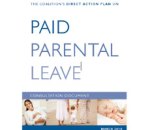This article originally appeared on Hoyden About Town.
My attitude to the vast bulk of elections, including the 2010 Federal election, is “I don’t like any of this, please get me out of here”. I usually intend to make an informed decision based on policies and then have trouble even following the news coverage. So, in the spirit of public acts helping enforce private commitments, I’m going to review a few policies for Hoyden.
 First up, Direct Action on Paid Parental Leave, the Coalition’s
First up, Direct Action on Paid Parental Leave, the Coalition’s consultation document
: a final policy is yet to come.
This has been fairly well publicised, but the basics are that it provides paid parental leave for 26 weeks following the birth or adoption of a child. The leave will be subject to a work test, and be paid ranging from the minimum full-time wage, for any person paid at or below this rate, to a maximum of matching a $150 000 per annum salary (that is, a carer will receive somewhere from $14 000 to $75 000 gross while on leave depending on their previous earnings). The current Baby Bonus will be paid to carers who don’t meet the work test, or to anyone who chooses it over the Paid Parental Leave scheme. It will be funded by an additional corporate tax on a small set of seemingly unidentified companies.
The big news about this policy yesterday (Coalition accused of leaving dads out of parental leave plan, pressured on costings, Dads cut out of full-pay parental leave scheme) was that male primary carers would be paid their female partner’s (presumed) lower wage if they took the leave. This was quite incoherent, and evidently is going to be a change in the final policy, because in this document, fathers weren’t going to be eligible for more than 2 weeks of leave at all. The document itself is a little internally inconsistent, beginning with a nod to primary carers in general:
The Coalition’s Paid Parental Leave scheme will provide primary carers (in the vast majority of families, mothers) with 26 weeks paid parental leave…
But later, the “carers (let’s face it, probably mothers)” phrasing is dropped, in favour of:
… fathers will be able to use two weeks of the 26 weeks of Paid Parental Leave that will be available, either simultaneously with the mother’s leave or separately.
A family can lose one of its two incomes for a period of time as the mother gives up or reduces paid employment to care for the child.
The Coalition is committed to protecting and improving the well-being of families, particularly that of the mother and child, by ensuring a mother can afford to stay at home during the early stages of her child’s development… In recognising this, the Coalition’s Paid Parental Leave scheme will assist mothers to take the recommended minimum of six months leave.
I’m genuinely unclear from this about whether they originally intended provision for fathers or any other primary carers to actually take the leave.
They have quite a few nods to postpartum recovery and especially the need for mother-child contact to establish breastfeeding:
The proposed Paid Parental Leave scheme will enhance child and maternal well-being by providing financial support to mothers while they are outside the paid workforce recovering from childbirth, establishing breastfeeding and bonding with their newborns… Six months is also the minimum period of exclusive breastfeeding recommended by the Australian National Health and Medical Research Council and the World Health Organisation.
But it’s a long way from separating the idea of paid parental leave into maternity leave for recovery and establishing breastfeeding and primary carer leave for, possibly, a different carer.
Purely in terms of entertainment, we have some Labor’s-big-debt snark:
The Coalition would prefer to fund our Paid Parental Leave scheme from a Budget surplus, but this is not possible due to the large debt and deficits run up by the Rudd Labor Government.
And is this some WorkChoices nostalgia I see before me?
The [Howard Government] also supported women’s choice by… introducing more flexible workplace conditions which provided parents, particularly mothers, with the choice of working part time or flexible hours.
Observations:
- This is a generous scheme, as the document points out, both in comparison to Labor’s scheme, which has a maximum payment of under $10 000 gross and which does not provide any option to share even 2 weeks of the leave with another carer, and in comparison to most other schemes worldwide, which mostly are either shorter or pay less.
- It’s especially generous to carers already earning a higher income, although this is fairly typical of worldwide schemes: either you get a payment linked to the minimum wage, or you get a payment linked to your recent income.
- The implementation of the policy in the context of any family that’s not built around a female-male couple who are both legal parents of the child is not at all clear from this document. It’s especially unclear how the payment works if the baby care is shared by more than one household.
- I do not know why it is emphasised that a carer who passes the work test could still choose to receive the Baby Bonus. The current Baby Bonus is valued at just over $5000 tax free, and is no longer paid as a lump sum, but is also paid over 26 weeks.The only case I can come up with where that’s going to be better than the Coalition’s scheme involves higher order multiples (since the scheme will not pay multiple times for a multiple birth).
